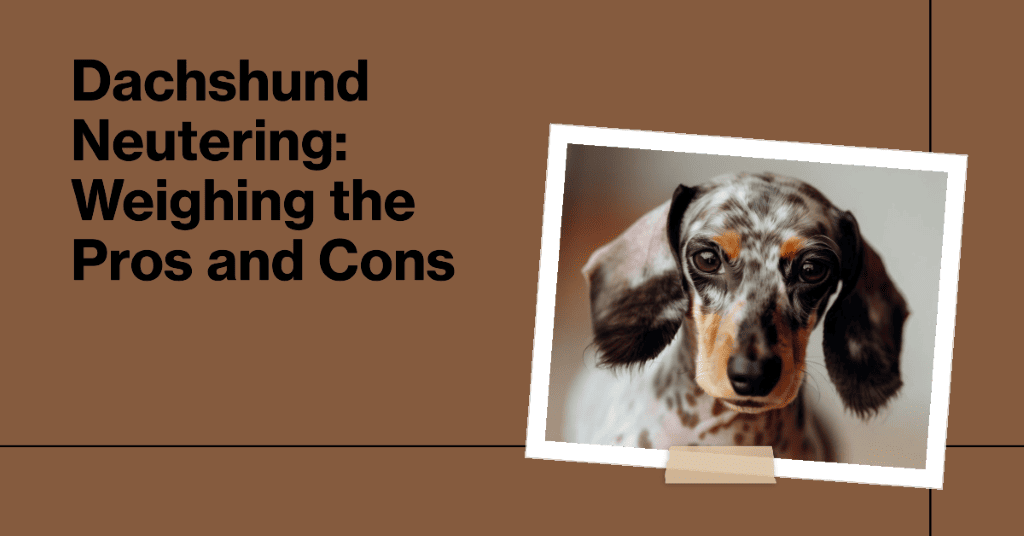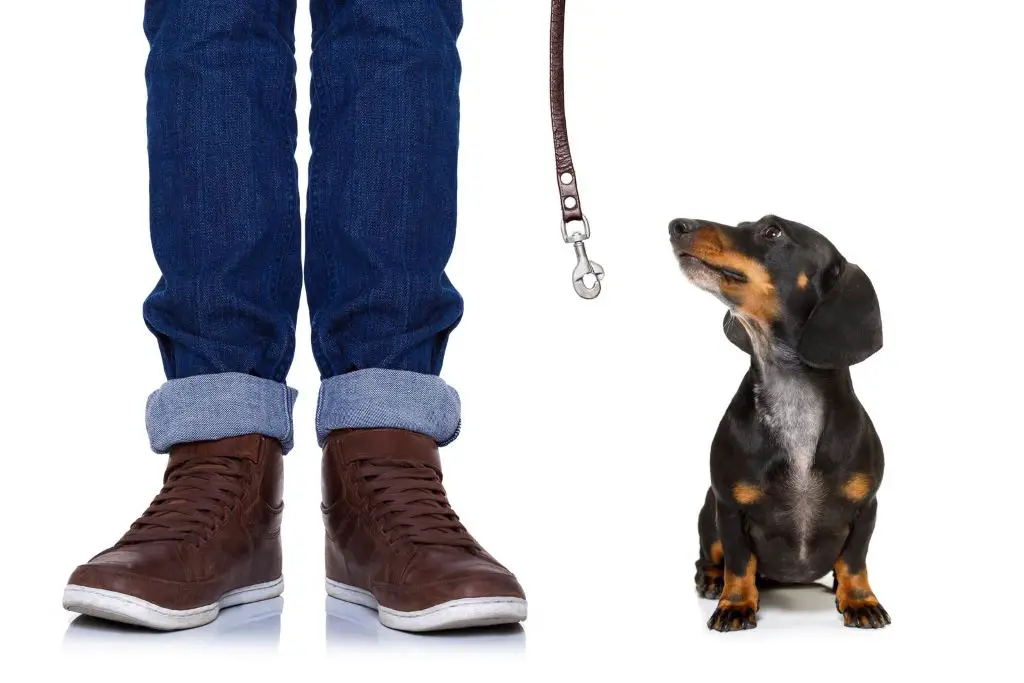When it comes to neutering your dachshund, there are pros and cons to consider. Neutering is a surgical procedure that removes the testicles of male dogs and the ovaries and uterus of female dogs. It is often recommended by veterinarians as a way to control the pet population and reduce the risk of certain health issues.
One of the main advantages of neutering your dachshund is that it can reduce the risk of certain cancers and tumors. Neutered males have a lower risk of prostate cancer, while spayed females have a lower risk of mammary gland tumors and uterine infections. Neutering can also reduce the risk of certain behavioral problems, such as aggression, marking, and roaming. However, it’s important to note that neutering is not a guarantee that these issues will disappear completely.
On the other hand, there are also potential drawbacks to neutering your dachshund. Recent research suggests that neutering, especially at a young age, may increase the risk of joint disorders such as cranial cruciate ligament tears, hip dysplasia, and elbow dysplasia. Additionally, neutering can have an impact on your dachshund’s metabolism and energy levels, which may lead to weight gain and lethargy. It’s important to weigh the pros and cons of neutering and discuss your options with your veterinarian before making a decision.
Understanding Dachshund Neutering
Defining Neutering
Neutering is a surgical sterilization procedure that involves the removal of a male dachshund’s testicles or a female dachshund’s ovaries and uterus. This procedure is also known as spaying for females. Neutering is a common procedure that is performed by a licensed veterinarian.
The Neutering Process
The neutering process involves several steps. First, the dachshund will be given anesthesia to ensure that they do not feel any pain during the procedure. Then, the veterinarian will make an incision in the appropriate area to remove the reproductive organs. The incision will then be stitched up, and the dachshund will be monitored for any complications.
When to Neuter
The decision to neuter your dachshund should be made after careful consideration of the pros and cons. Neutering can help reduce the risk of certain health issues, such as prostate cancer in males and mammary tumors in females. It can also help reduce the overpopulation of pets and decrease the risk of certain diseases.
However, recent research has suggested that neutering may also increase the risk of certain health issues, such as joint disorders, in certain breeds, including dachshunds. Therefore, it is important to discuss the timing of neutering with your veterinarian and take into account your dachshund’s individual health and lifestyle factors.
Overall, neutering your dachshund is a personal decision that should be made in consultation with a licensed veterinarian. It is important to weigh the pros and cons and consider your dachshund’s individual needs before making a decision.
Pros of Neutering Dachshunds
If you’re considering neutering your Dachshund, there are several benefits to keep in mind. In this section, we’ll discuss the most significant advantages of neutering your furry friend.
Health Benefits
Neutering your Dachshund can have several health benefits. For male Dachshunds, neutering eliminates the risk of testicular cancer and reduces the risk of prostate problems. For female Dachshunds, neutering eliminates the risk of ovarian and uterine cancer, as well as reduces the risk of mammary gland tumors. Additionally, neutering can help prevent certain behavioral problems that can lead to injuries or accidents, such as roaming and fighting.
Behavioral Changes
Neutering can also have a positive impact on your Dachshund’s behavior. Male Dachshunds that are neutered tend to be less aggressive and less likely to mount or mark their territory. Female Dachshunds that are neutered tend to be less likely to experience mood swings associated with their heat cycles, which can help prevent unwanted litters and reduce the risk of behavioral problems.
Population Control
Neutering your Dachshund can also help control the pet overpopulation problem. By neutering your Dachshund, you can help reduce the number of unwanted litters and decrease the number of dogs that end up in shelters. This, in turn, can help reduce the number of dogs that are euthanized each year due to overpopulation.
Cons of Neutering Dachshunds
Neutering your dachshund is a personal choice that requires careful consideration of the pros and cons. While neutering has its benefits, it also has some drawbacks that you should be aware of. In this section, we will discuss some of the cons of neutering your dachshund.
Health Risks
Neutering your dachshund can have some health risks. Studies have shown that neutered dogs are at a higher risk of developing certain types of cancer, such as osteosarcoma and hypothyroidism. Neutered dogs are also at a higher risk of developing intervertebral disc disease, which can lead to paralysis.
Behavioral Risks
Neutering your dachshund can also have some behavioral risks. Neutered dogs may be more prone to developing incontinence, which can be a frustrating and costly problem to deal with. Neutered dogs may also be more prone to weight gain, which can lead to other health issues such as joint problems, heart disease, and diabetes. Additionally, neutered dogs may be more prone to developing certain behavioral problems such as aggression, anxiety, and fear.
Post-Surgery Risks
Neutering your dachshund requires general anesthesia, which can be risky for some dogs. While anesthesia is generally safe, there is always a risk of complications such as allergic reactions, respiratory problems, and even death. Additionally, neutered dogs may experience pain after surgery, which can be managed with pain medication, but can still be a cause for concern.
While neutering your dachshund has its benefits, it also has some drawbacks that you should be aware of. It is important to weigh the pros and cons carefully before making a decision. If you do decide to neuter your dachshund, make sure to discuss any concerns with your veterinarian and follow their recommendations for post-surgery care.
Neutering Male vs Female Dachshunds
When it comes to neutering your dachshund, there are some differences between male and female dogs that you should be aware of. In this section, we’ll take a look at the pros and cons of neutering male and female dachshunds.
Neutering Male Dachshunds
Neutering a male dachshund involves removing the testicles, which eliminates the production of testosterone. This can have several benefits, such as reducing aggression, marking, and roaming behavior. Neutered males also have a lower risk of certain health issues, such as prostate cancer.
However, there are also some potential drawbacks to neutering male dachshunds. Some studies suggest that neutered males may have a higher risk of certain health issues, such as obesity, joint problems, and urinary tract infections. Additionally, neutering can affect the dog’s behavior and personality, although the extent of these changes can vary depending on the individual dog.
Neutering Female Dachshunds
Spaying a female dachshund involves removing the uterus and ovaries, which eliminates the dog’s heat cycles and the ability to reproduce. This can help prevent certain health issues, such as uterine infections and certain types of cancer. It can also eliminate the risk of unwanted litters.
However, there are also some potential drawbacks to spaying female dachshunds. Some studies suggest that spayed females may have a higher risk of certain health issues, such as obesity and joint problems. Additionally, spaying can affect the dog’s behavior and personality, although the extent of these changes can vary depending on the individual dog.
Caring for Your Dachshund Post-Neutering
Neutering your dachshund is a responsible decision that can have significant benefits for their health and behavior. However, it’s essential to take proper care of your furry friend during their post-surgery recovery period. This section will provide you with some essential tips to ensure that your dachshund recovers smoothly and quickly.
Immediate Post-Surgery Care
After the surgery, your dachshund will be groggy and disoriented. It’s essential to keep them in a quiet, comfortable, and warm area to ensure they rest and recover. You should also monitor them to make sure they don’t lick their incision site or remove their stitches. To prevent this, you can use an Elizabethan collar or a surgical suit.
Your vet will provide you with post-operative care instructions, which you should follow diligently. This may include administering medication, changing dressings, and monitoring the incision site for signs of infection.
- Protective Recovery Suit: The professional surgical recovery suit can protect your little pet from licking wound and help dog recover sooner after operation. It can avoid animal suffer from skin disease when exposing to outer environment and keep little animal calm down when it gets anxious.
- Soft Comfortable Material: The fabric of the protective shirt for dog is soft and comfortable. Your puppy would love to wear it. Thin and breathable cloth is safe for your puppy.
- Special Design: Convenient snap buttons on the back to make the shirt easy to put on, and the pet can not take it off easily. The sewing circle on the belly part is for male dog to pee. You just need to cut it out, then your male dog can pee without bothering to take it off.
- Occasions: The recovery suit is a perfect E-collar alternative for female and male dogs. Your little puppy can wear it indoor to avoid shedding hair everywhere, so you don’t have to always clean the house. and keep little flies from getting close, keep the hair clean when goes outdoor. Stretchy material and nice fit allows your cute pet walk and run flexibly and sleep well at night. Its suitable for any seasons to wear.
- Caring and Service: The post surgery E-collar alternative is machine washable, which can save sometime from busy life. Please let us know if your have any problem with our product, we would like to provide you a satisfying solution.
Long-Term Recovery
Your dachshund’s recovery time may vary depending on their age, health, and type of surgery. However, most dachshunds recover within a week or two. During this time, it’s essential to ensure that they rest and avoid any strenuous activities.
You should also monitor their appetite, water intake, and bowel movements. If you notice any changes in their behavior or health, contact your vet immediately.
It’s crucial to keep the incision site clean and dry. Your vet may recommend using an antiseptic solution to clean the area and changing the dressing regularly. You should also prevent your dachshund from licking the incision site by using an Elizabethan collar or a surgical suit.
The Cost of Neutering a Dachshund
Neutering your dachshund is an important decision that can have long-term effects on your pet’s health and behavior. One of the factors that you need to consider is the cost of the procedure. In this section, we will discuss the cost of neutering a dachshund and the factors that influence it.
Factors Influencing Cost
The cost of neutering a dachshund can vary depending on several factors, such as:
- Your location: The cost of the procedure can vary depending on where you live. In general, the cost is higher in urban areas than in rural areas.
- The size of your dachshund: The cost of neutering a dachshund can also depend on its size. Larger dachshunds may require more anesthesia and surgical time, which can increase the cost.
- The age of your dachshund: The age of your dachshund can also affect the cost of neutering. Generally, the procedure is more expensive for older dogs.
- The type of clinic: The cost of neutering can vary depending on the type of clinic you choose. For example, low-cost clinics may offer the procedure at a lower cost than traditional veterinary clinics.
Cost Comparison
The cost of neutering a dachshund can vary widely depending on the factors mentioned above. According to Petfinder, the cost of neutering a dachshund can range from $45 to $300 or more. Here is a comparison of the average cost of neutering a dachshund in different types of clinics:
| Type of Clinic | Average Cost of Neutering a Dachshund |
|---|---|
| Low-cost clinic | $45 – $135 |
| Traditional veterinary clinic | $200 – $300 |
| Specialty clinic | $300 – $500 |
It’s important to note that the cost of neutering a dachshund can vary depending on your location and the specific clinic you choose. You should always do your research and compare prices before making a decision.
In conclusion, neutering your dachshund is an important decision that can have long-term effects on your pet’s health and behavior. The cost of neutering can vary depending on several factors, such as your location, the size and age of your dachshund, and the type of clinic you choose. It’s important to consider all of these factors and compare prices before making a decision.
Dachshund Neutering: A Breeder’s Perspective
As a breeder, you want to ensure that your Dachshunds are healthy, happy, and well-cared for. When it comes to neutering your Dachshunds, there are several factors to consider. In this section, we will discuss the genetic considerations and breeding ethics involved in the decision to neuter your Dachshunds.
Genetic Considerations
As a responsible breeder, you should be aware of the genetic risks associated with neutering Dachshunds. Recent research has shown that neutering can increase the risk of developing joint disorders such as cranial cruciate ligament tears or ruptures, hip dysplasia, and elbow dysplasia. Additionally, neutered females are at a significantly higher risk of intervertebral disc disease (IVDD) than entire females.
Furthermore, neutering your Dachshunds can have an impact on their overall health and lifespan. Studies have shown that neutered dogs are at an increased risk of developing certain types of cancer, such as osteosarcoma, hemangiosarcoma, and lymphoma. Additionally, neutered dogs have a higher risk of obesity, which can lead to other health problems such as diabetes and heart disease.
Breeding Ethics
As a responsible breeder, you must consider the ethical implications of neutering your Dachshunds. Neutering can have a significant impact on the breed’s gene pool, which can affect the breed’s health and genetic diversity. By neutering your Dachshunds, you are removing them from the breeding pool, which can limit the genetic diversity of the breed.
Furthermore, neutering your Dachshunds can have an impact on their behavior and temperament. Neutered dogs are often less aggressive and more docile than intact dogs. While this may be desirable in some situations, it can also have a negative impact on the breed’s working ability and temperament.
As a breeder, you must carefully consider the genetic and ethical implications of neutering your Dachshunds. While neutering can have benefits, such as reducing the risk of certain health problems and unwanted litters, it can also have negative impacts on the breed’s health and genetic diversity. Ultimately, the decision to neuter your Dachshunds should be made on a case-by-case basis, taking into account the individual dog’s health, temperament, and breeding potential.
Frequently Asked Questions
What is the appropriate age to neuter a Dachshund?
The appropriate age to neuter a Dachshund is around six months, before sexual maturity. However, it is best to consult with your veterinarian to determine the best time for your specific dog.
How much does it cost to neuter a Dachshund?
The cost of neutering a Dachshund can vary depending on factors such as location, veterinary clinic, and the age and size of the dog. On average, the cost can range from $200 to $500.
What are the potential risks associated with neutering a Dachshund?
As with any surgical procedure, there are potential risks associated with neutering a Dachshund. These risks can include infection, bleeding, and adverse reactions to anesthesia. However, these risks are relatively low and can be minimized by choosing a reputable veterinarian.
Do neutered male Dachshunds experience behavioral changes?
Neutering a Dachshund can lead to a decrease in certain behaviors, such as roaming, marking, and aggression. However, it is important to note that neutering alone may not completely eliminate these behaviors and that training and socialization are still necessary.
What is the recovery time for a Dachshund after neutering?
The recovery time for a Dachshund after neutering can vary depending on the individual dog and the surgical method used. Generally, it takes about two weeks for the incision to heal and for the dog to recover fully. During this time, it is important to limit activity and prevent the dog from licking or scratching the incision.
Are there any health benefits to neutering a Dachshund?
Neutering a Dachshund can provide several health benefits, such as a decreased risk of certain cancers and infections. It can also help prevent unwanted litters and reduce the overpopulation of dogs. However, it is important to weigh these benefits against the potential risks and to make an informed decision with the guidance of a veterinarian.










